Samantha Tonge's Blog, page 5
December 31, 2018
Edit Your Resolutions!
I don’t make New Year’s Resolutions anymore. But for years I used to. And oh how grandiose they were, without me even realising it.
“This year I will get published.”
“This year I’ll stop drinking.”
Over the years I’ve pledged to reach career heights or sort out all my mental health issues within the space of twelve months.
And every time I’ve failed to reach my set goal. Is it any wonder?
I’d advise you to look carefully at any resolution you make and give it a good edit. Pare it down to the minimum – otherwise you are going to end up disheartened and disappointed.
Let’s take my example of pledging to get published. For a number of years I vowed I would accomplish this but it’s impossible. It didn’t matter how hard I worked, so much of achieving that target is out of an author’s control. Your manuscript has to fall into the hands of the right agent and publisher, and for commercial fiction it has to be suited to the market and your writing needs to be at the top of your game…
So, in time, I learned to make my writing resolutions more realistic. For example “This year I will polish my manuscript and send it out to ten agents” or “This year I will enter some writing competitions and if I can save enough money pay have an editorial report done on my current work-in-progress.” There are many steps to getting published and it is far more satisfying, as time passes, to tick off each one as you accomplish it. Appreciating the journey and looking at it as a series of smaller parts will make it far more likely you’ll reach that ultimate destination.
And this applies once you have signed your first publishing contract. Hands up, secretly I still covet that film deal and stroll down the red carpet. But if I made that my New Year’s resolution, the likelihood is I’m going to feel like a massive failure by the end of the year when I haven’t cast Jason Momoa in the lead of my latest novel or been interviewed on Graham Norton’s sofa!
My resolutions to stop drinking were also unrealistic. Like publishing, the journey to sobriety is made up of many steps. But I’d try in one giant leap and just stop point blank without changing any other aspect of my life. Of course, I would fall off the wagon by the end of January (or often its first week) and feel like a complete loser. Addiction services and AA helped me to refine and edit my goals.
For example, I had quirky routines around my drinking and one was that I’d never allow myself to start before 6.40pm. So a first step – a first resolution, a first small change – was to break this habit by going for a coffee, having a bath, cooking or taking up a hobby at that specific time each day, instead. And doing this was the first step to stopping drinking all together. Each day I managed this, it inspired me to continue my journey.
So go and edit your resolution. Step back from the bigger picture. Analyse exactly what it is you really need to do, to reach your ultimate target. For example to you need to lose two stone? Perhaps resolve to cut out snacks and get off the bus one stop early to walk, as a starting point, instead of embarking on a crash diet.
The photo below is of a writer who’s had highs and lows but has learnt to appreciate ALL the special moments along the way, big or small, such as great reader feedback, foreign rights sales or simply an editor’s enthusiasm. It’s also of a woman who this week turned two years sober. Oh I slipped after three months, and picked up again – that taught me a lot. And I still have days where I want to drown my problems in a bottle of wine. But I don’t. I continue to pursue my goal, one day and one task at a time, relishing the smaller milestones and victories that keep pushing me forwards to living my dream.
And – most importantly of all – I don’t beat myself if I fail at the target I’ve set myself.
As Nelson Mandela once said:
“I never lose. I either win or learn.”


November 19, 2018
How to Help Someone With Poor Mental Health
I used to love drawing at school and recently picked up my pencils again after 35 years. This was my first attempt at drawing a feather and the result immediately reminded me of someone with poor mental health.
At a first glance it looks okay. But on closer inspection something isn’t quite right. It isn’t in the best of shape. It doesn’t look vibrant and alive. And this got me thinking about how good people are at hiding their problems so that, on the surface, they look as if everything is fine. No one knew about my drinking issues and the internal turmoil that caused them. I still looked after the family and did my job. I still smiled and laughed and made jokes.

It’s a lonely, isolating business, having a mental health illness and if you know someone who’s suffering here’s what you can do – and these points are for me just as much as anyone. Just because I’ve “been there” doesn’t mean I don’t need reminding of how I can best help someone else who’s struggling.
(Just to note, the following suggestions are based on my own experience as a patient of addiction treatment (alcohol/eating) who has felt anxious/depressed – not as a trained medic -and as such they are not necessarily applicable to any specific mental health diagnosis such as bipolar, suicidal thoughts/tendencies or psychotic episodes etc.)
Empathy. This is absolutely crucial and on a training course I did to peer mentor young people in addiction we discussed it in depth. Empathy is not starting a sentence with “at least” – for example “at least you have a family to support you,” “at least you have a great job,” “at least you have a roof over your head,” and so on. The outside factors are irrelevant. It’s what’s happening on the inside that counts – as proven by the many celebrities who end up in treatment despite, on the surface, having the perfect life with money, fame, good looks, great careers…
Empathy is about LISTENING and not necessarily trying to fix things. I find this personally very difficult, especially as a parent – if someone’s having a tough time I want to jump in and immediately start offering what I think are solutions. But more often than not people just want to talk and be heard. That’s all. It’s about giving them the time and space to do this. It’s about simply saying that’s tough, I’m sorry to hear you are suffering – I’m here for you. It’s about giving hugs – that emotional and physical support means so much.
See the illness for what it is – something separate. If someone breaks their leg, you see that as something separate to the patient and it should be the same with mental health. If someone has depression or anxiety or whatever, that person is still there, somewhere inside – the mental illness is a medical problem they are suffering from, it’s not them.
My drinking and eating disorder issues, caused by my mental health problems, made me isolate. Made me lie. Made me over-sensitive. Defensive. Made me emotional. Tearful… in the same way a broken leg might make you walk funny or wince in pain or not be able to get out much socially.
If you can see the mental illness as a separate entity that might help you have more empathy if you are finding that difficult – because the mental illness of others is difficult to live with and you shouldn’t be hard on yourself for having conflicted feelings about this. Poor mental health can feel impossible to understand. Back in the day I even had a doctor tell me to simply eat normally. Irrational behaviour is difficult to explain and can lead to frustration and impatience growing in people trying to help. And I get it. There’s nothing worse than feeling helpless in the face of someone you care for being so unhappy. But try to see the anxiety – or whatever the problem is – as a beast your loved one is trying to tame, as opposed to being part of them.
Whilst just listening is crucial, if you feel the time is right, don’t feel afraid to nudge people towards treatment options. Although this has to be well-judged. With any mental illness – especially addiction – the patient, him/herself, has to acknowledge they have a problem and get help. They have to be ready. But – going by personal experience where I’ve helped people – there is nothing wrong with subtle suggestions, over time, to plant the seeds of an idea that maybe a visit to the GP or counselling could be helpful. Don’t be so forceful, don’t put so much pressure on that you scare the person away, but at the same time make it easy for them to access the information they need. Perhaps leave some leaflets lying around or message them a couple of links and leave it at that for a while.
Don’t give up on them. For the last couple of years I’ve cancelled no end of engagements. Pulled out at the last minute. Said yes but meant no. Yet still friends and family ask me out and I’m grateful. Try not to take it personally if someone pulls out of an event. It won’t be that they don’t want to see you or don’t see the invite as something important and appreciated. If they rang up and said they’d been struck down by gastric flu you’d understand. Try to accept that a sudden bout of anxiety or low feelings is no different. As author and mental health advocate Matt Haig is always saying, physical health, mental health, it’s all part of the same.
Very importantly – think about your own needs. Firstly, you are no good to anyone else if you don’t look after yourself and become ill… but secondly, and more importantly, you matter too. It can be draining and emotionally challenging being there for someone who is sick. Sometimes you have to be put yourself first in order to keep well. Indeed, this mindset helps me maintain my recovery. A couple of times over the last year or two I have had to distance myself from people who are ill because it might threaten my own mental strength and sobriety. This is not selfishness – it is self-care. Or, as we call it in the addiction world, keeping yourself safe.
Lastly, I would like to thank anyone reading this post who supports – or is considering offering support to – a friend or family member in need. Give yourself a big pat on the back. It is all too easy to turn a blind eye, to take the easy route and not get involved.
You never know if one day you too might end up needing treatment. I know that better than anyone and during those times it is the patience, the understanding and love of people that matters most.

November 10, 2018
Five Years Published!
Today marks the 5th anniversary of my debut novel being published!
Doubting Abbey was inspired by Downton and became a Christmas bestseller. It was such an exciting time watching it climb the charts. At one stage I even had a Hollywood movie producer reading it. You can imagine the jumping up and down when that news came in!
But today gives me an opportunity for reflection.
What a roller coaster.
Since the 10th November 2013 I’ve had ten books published, I’ve had two agents, two publishers, I’ve changed genres, I’ve won an award, I’ve had two novels in the Amazon Top Ten…
And I’ve ended up needing mental health treatment. Whilst my career didn’t cause my alcohol and eating problems, it magnified them.
2013 to 2018 has been an intense time. One of the most intense periods of my whole life.
So what have I learnt?
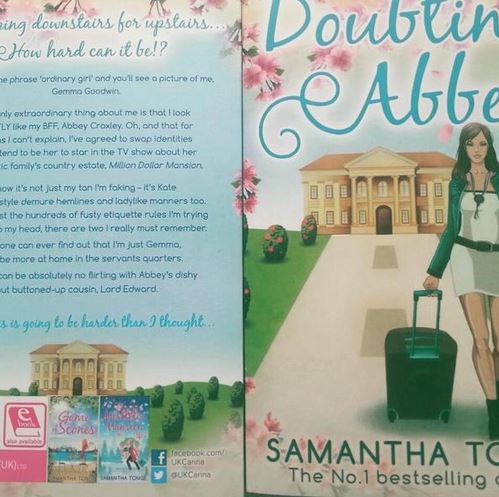
That if you are going to work incredibly hard, if you are going to challenge yourself personally and professionally in ways you never thought possible, the rewards are unimaginable…
BUT
self-care must be a top priority.
I allowed my writing to stretch across each day to the exclusion of hobbies and getting out of the house.
I allowed it to stretch across weekends.
I allowed myself to become so involved with my career and social media that I began to think those things were actually *me*. That if a book topped the charts Sam Tonge was a success. That if a book didn’t Sam Tonge was a failure.
And as my mental health deteriorated I began to feel as if I was living a double life, as if I had two faces – Samantha Tonge The Author and Sam Tonge who was secretly struggling.
I paid the price for this.
So, new authors who’ve just signed a deal… take a deep breath. Amazing things are ahead of you! But your writing career is not the sum of you. It may be a passion, a vocation, but ultimately it is a job and the peaks and troughs should not dictate your happiness.
Now I’m just me, online and off, warts and all. And what a relief.
LOOK AFTER YOUR MENTAL HEALTH. My tips for that are here.
And by doing so, you should enjoy the ride 
September 29, 2018
Reasons to Rewrite
A few weeks ago I wrote the first draft of Book 12 very quickly – 80,000 words in one month. This means it came straight from the heart and I was able to write it with a clear view of the characters and plot, without long breaks from the project meaning continuity became hard work. There are casualties from speed-writing in this way – I’ve just completed the first read-through and had to spend a lot of time developing the minor characters, for example. Having had ten books published now, in my experience however long that first draft takes the following are usually reasons why you’ll need to do a rewrite:
The settings aren’t vibrant enough. When I’m in the flow of writing a first draft I find it is often the settings that can suffer. They’re a hugely important part of the story. Not only do they help the reader visualise where the characters are, they can also reflect mood or hint at plot. During the rewrite I focus on really involving all of the five senses. Say my protagonist visits a coffee shop – I’ll develop the smells and noises. I’m thinking coffee grinding, a till bleeping, customers deep in chat, cutlery on plates. Delicious aromas might accompany a feel-good scene or give welcome relief after a drama, along with a warm, visually cosy decor. The amount of work you need to do will largely depend on how detailed your first draft is but speaking for myself I often get so excited about the plot and dialogue and focus on those things, that my first draft settings suffer.
By the same token characters are not fully developed. I don’t think much about my protagonist before I start a new manuscript. I just dive in and keep continually going back to tweak him/her as I go. By around Chapter 6 I usually have an in-depth idea of what they are like and can then just continue moving forwards. However, as I mentioned above, when I write first draft I don’t do this with the minor characters that are mostly created as I go along. Consequently during the first read-through I’ve just done I even found I had to completely change some of the supporting cast’s motivations. This meant adding in a couple of chapters. Minor characters are there to assist the plot and show important dimensions of the protagonist – how/why they were as they were, how/why they’ve changed. So whilst minor in presence, they are major in importance and should be fully thought-through and rounded.
The narrative needs refining. For the most part my first draft is thrown down onto the page – that’s the best way I can describe it. So the metaphors or similes aren’t necessary appropriate. The rhythm of the sentences might not flow easily. There’s repetition. I might use adverbs too liberally. I might tell – or show – too much (I’m a great believer in tell having its place!) For me the main point of writing is to exactly transfer my thoughts and emotions onto the page. Sometimes this takes time, so I compromise during the first draft. The rewrite will be when I might consult my thesaurus, and will really hone my craft and rethink words and sentences with care. Because if I get hung-up on doing this during the first-draft I can lose my mojo and come to a halt. And I find it’s such a joy and so satisfying during the rewrite to really take my time and polish or restructure what’s already on the page.
The dialogue needs working on. It might not sound natural. Or may not sound unique to each character speaking it. Perhaps it contains superfluous words. I find I am always having to remove Yes and No’s. Certain dialogue tags may not be necessary (he said, she called, etc). And this time around I had to remove many nods and smiles that accompanied my characters’ dialogue.
And of course editing, editing, editing such as tightening sentences and checking continuity, the timeline and tense. Book 11 was written in the first person present, this Book 12 in the first person past. On reading through I found that I’d slipped into the present many times and had to change that.
Also double-check your facts. If you include anything written in a foreign language, is it correct? Have you thoroughly researched anything historical? What about locations? If, like me, you don’t do all of the necessary research before the first draft, then the rewrite process may not involve checking but finding out things for the first time.
Take a step back from your personal experience. As writers we inevitably put ourselves and aspects of our lives into our stories – emotions, themes, perhaps even characters plot. This is ploughed into the first draft. But don’t make the mistake of thinking this means you don’t need to still do research. My latest release, Forgive Me Not was inspired by my own journey through addiction services but I still found I needed to interview case workers to make sure the detail of the novel was spot on. It’s also about Alzheimer’s and my family has suffered experience of this – but everyone’s experience is unique and I still researched how this disease had affected other people. During the rewrite take a step back and consider if you have explored all aspects of your themes or if it’s one-sided by being simply based on what you’ve gone through yourself.
Of course, some rewrites need to be more brutal – and this may be discovered after passing your manuscript on to a trusted beta reader, editor or agent. I virtually had to start Forgive Me Not again from scratch and I blogged about that here.
Whatever your reasons to rewrite, realising that there will be some helps soften the blow when you come to that first read-through or receive initial feedback. First drafts are never oven-ready for publication and try to see this as a positive. Now is your chance to really make that precious story sing!
Good luck!

September 17, 2018
How to Write a Novel in a Month
On the 17th August I’d written 2500 words of Book 12 (that’s when I started recording my word count). By yesterday, the 16th September, I’d written 80,914 and The End.
This was not planned but the characters overtook me. Their story demanded to be written and I was often writing 5000 words a day.
It didn’t feel as if I was rushing – and I would never advocate that. In my experience the plot and characters of every book dictate how quickly or slowly you write that particular novel.
Having said that, I do believe I can offer some tips if you feel you are struggling – or if you are about to take part in November’s yearly NaNoWriMo (National Novel Writing Month).
Although just to note – writing is my full-time job. My children are not small. My husband has been equally busy this last month. To a degree my time has been my own.
Main character – I don’t get hung up on getting to know my main character before I start. I used to go though all those processes recommended in books about writing. Like *sitting down* with my character and asking him/her twenty questions about their favourite hobby, colour, type of clothing, pet etc. And this technique work for many authors, but not me anymore. I just decide on the basics and crack on. This means that as I write each chapter I discover new things about my protagonist and keep go back to tweak what I’ve already written. By around chapter six I usually know him/her pretty well and can just continue forwards with no more back-tracking.
Research – to a degree the same applies here. I do a considerable amount before starting, so that the words can just flow. For this book I’ve had to thoroughly research a particular job, which involved interviewing someone and watching youtube videos – and I also needed to look into various emotional issues and a specific period in history. But once I’ve started I try not to become obsessed with checking every fact and item of data. I try to leave as much of the smaller stuff as I can to the rewrite, so that the flow of prose and dialogue isn’t interrupted during that heartfelt first draft.
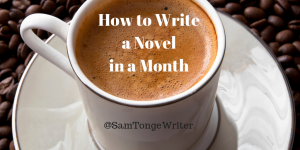
I get up early – my alarm goes off at 6.30am and I am on my bicycle by 7. By 7.30am I am back indoors and at my desk. I’ll catch up on social media and that write usually a chapter before a bath and breakfast around 10.30am. That leaves the rest of the day to go over the morning’s work, to write maybe another chapter and then fit in domestic priorities. Talking of which…
A degree of selfishness is necessary to write this many words in a month – and I don’t feel apologetic about that. This is my career. It pays bills. So I may cook from scratch say three times a week. Other members of the household do their bit and then if we’re all busy it’s a case of getting takeaway or using convenience foods. Housework is pared down to the minimum. I’m not superwoman. I know my limits. If I’m going to dedicate more time than usual to one aspect of my life then something else is going to have to give.
Create a diverse cast of characters (obviously only if that fits your story). Book 12 stars a wide range of eclectic personalities and in the end I had to cut some out as they all had so much to say – and because they were so different from each other the writing always felt fresh. This is one of the main reasons I didn’t hit writer’s block or find I had a single day where the writing felt samey and dragged.
A mind free from *stuff* – don’t put yourself under pressure to attempt to up your word count if you are current facing personal challenges. Writing this book made me realise just how much my mental health had improved since finding myself in an addiction clinic in 2016 (I talk about that here and how it inspired my latest novel Forgive Me Not) . With book 12 I’ve been going to sleep each night planning the next chapter. This meant that when I got up the next morning I could crack on without any prior thought.
But I haven’t worked like this for years. When my mental health issues were most challenging the time nodding off would be spent going over and over my problems, negative thoughts whirring. These days I’m so grateful that my mind is free from a lot of that *stuff*. If yours isn’t then be kind to you. Concentrate on getting better. I took a step back from my career for around 18 months to get to the place I am now. Writing a novel in a month is exciting – but intense.
Log your word count each day. I did this in a notebook, however little I’d written, and found it so inspiring because it acted as concrete proof that my book was growing and that every day’s efforts mattered. I also posted my daily word counts on Twitter with a suitable gif, just before I logged off at the end of each afternoon. It felt like a fun reward for all the hard work I’d put in.

Coffee. Lots of coffee. And chocolate helps too. Like anything extreme – and writing in this way is – it’s not the healthiest of options. But everything in moderation. I’m now getting back to my normal routine.
Take breaks This is very important to maintain your energy and motivation. If you try to work all hours or fit this one month writing challenge around other responsibilities such as a job or small children without taking breaks, you will end up ill or burnt out and suffering from writer’s block. During the day I would make sure I got out once for a walk to the shops or to meet a friend for coffee. I also had a strict cut-off time and finished each day no later than 7pm and then spent the evening relaxing.
And I certainly would never advise working like this month in, month out. Part of the reason I ended up ill in 2016 was due to stretching the days and stretching my working week over the weekends. You can only do so much.
I wish you the best of luck! And if you set yourself this challenge, I congratulate you for whatever amount your write. Being an author is a tough business. Inspiration doesn’t arrive on tap. But when it strikes, perhaps grab that moment and look for your takeout leaflets and coffee pot 
September 4, 2018
What My Rock Bottom Taught Me About Mental Health
I’ve just completed two years of various treatments for a drinking problem and eating disorder, both caused by mental health issues. There are positives to take from what has happened. On my journey into recovery I’ve learnt a lot about mental health as well as mindfulness and Buddhism. I feel armed with an arsenal of tools to – hopefully – prevent me hitting a rock bottom again.
Here are the most stand-out elements of the knowledge I’ve gained.
There is no such thing as normal – you will often hear someone with poor mental health enviously say they wish they were normal. It’s a false aspiration because every person has their story behind the scenes. Normality cannot be defined and therefore doesn’t exist. A better word to use is “ordinary”. And ordinary life it one to be valued where the small things matter like a beautiful sunrise or kind gesture. One key to good mental health is learning to be satisfied with the great things you’ve already got that you may be overlooking; and realising you don’t need to chase the high life to be happy.
Mother Nature has wired us think negatively – to protect us from taking risks. Once you recognise this you are given the power to understand your negative thinking and dismiss it. So try to identify those voices that are holding you back; telling you to be afraid of trying something new – telling you that you won’t be any good. Mother Nature was right to make us wary when we went hunting – but it’s less relevant if it’s about contacting a potential agent or going on a first date.
Other types of negative thinking can be disarmed once they see them for what they are. For example mindreading – thinking you know what other people are thinking. Say a friend walks down the street and ignores you, an immediate assumption might be that you’ve done something wrong and your self-esteem plummets. The thing is, you don’t have a crystal ball and don’t know the truth. Perhaps your friend didn’t see you or is simply having a bad day. And try not to label yourself. “I’m a bad person”. And ditch black and white thinking, like “I never get things right”. You’re human. Sometimes you will make mistakes. This doesn’t define you.
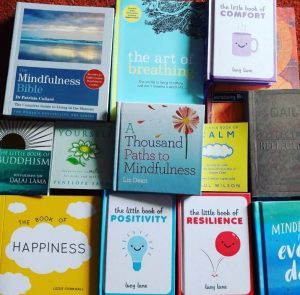
Mindfulness has taught me to live in the present and this helps mental health enormously. You can’t change the past so don’t let it fester. You can’t predict the future so there’s no point thinking about it. Took a bad interview yesterday? It’s over. Move on. Convinced you’ll fail the one tomorrow. You don’t know that so there is no point worrying. All of this seems very easy to say, but from personal experience I know that it really is possible, over time, to retrain your mind.
Buddhism has taught me not to attach to the good or bad times. A spate of great book reviews? Enjoy but it may not last. A poor sales ranking? That won’t last forever either. Any career – like life – enjoys peaks and suffers troughs. Buddhism has made me realise that attachment – to anything – brings expectations and that can lead to disappointment, feeling like a failure and low self-esteem if things don’t go to plan. I find it’s much healthier if I accept that life – health, careers, relationships – is fluid and ever-changing. This is especially useful if I suffer a set-back. I now have the perspective to look back and see the proof that terrible things may happen but life does move forwards again, eventually.
Talking really is good – for years I hid my eating disorder issues and later my problems with alcohol. I ended up feeling as if I was leading a double life. People have said I’m brave for coming out about my poor mental health but, to be honest, it just feels like a massive relief. And it’s been humbling, since speaking publicly, how many people have contacted me privately to share their problems. It’s worrying, as well, that they feel they have to hide their conditions. We wouldn’t hide an arthritic hand or sickness bug. We shouldn’t have to hide illnesses of the mind.
I learnt that treatment can be hard to get. I wasn’t at the end of the alcoholic spectrum, drinking 24/7 and needing a detox, and therefore my path wasn’t straightforward. Alcohol services have been cut and certainly in my locality funding for patients not as far into addiction has been lost. And it’s also a well-documented fact that nationally the treatment available for eating disorder sufferers is dismal, even though out of all mental illnesses it’s the one with the highest suicide rate…
BUT
I feel positive about the future – finally people are being more open. Talking about poor mental health is the only way we can get rid of stigma and save lives. It’s the only way governments will realise more needs to be done. And that’s one reason I’m so glad my new novel, Forgive Me Not, is getting into the hands of readers. I hope it offers an insight into addiction and the related mental health issues.
So if you’re going through a difficult time, don’t be ashamed of feeling down. Statistics prove you are far from alone. Open up. Tell someone. And begin your journey to getting better.

August 13, 2018
Ten Surprising Things About Being Published
Back in 2005, when I first started writing, I joined a wonderful online forum called WriteWords. There I learnt a lot, from published authors, about what it was like to have your dream come true – the good, the bad and the ugly. It prepared me, in part, for the journey I was about to go on. But there have still been many things that have taken me by surprise along the way and here are some of them… It’s been quite a publishing pinata…
One – my debut being published didn’t change my life to fit my fantasies. My book wasn’t turned into a movie. Brad Pitt didn’t star. I wasn’t invited onto Graham Norton’s sofa. I didn’t turn into a glamour puss or overnight become the owner of a Porsche.
The fulfilment came in different ways – a lovely review. Interest from family and friends. Support from the wonderful writing community. I soon realised it’s these immaterial things that mean so much.
Two – The release of each book (I’ve had ten published now) is just as terrifying and exhilarating as the last. Five years on and I realise that however well a novel does, you are only as good as your next book so that means you are always nervous about the publication of something new.
Three – it’s really hard work promoting a book. I never realised quite how much an author had to do, especially if they don’t have a PR person on hand to help. My first publisher gave me an information pack that gave guidelines and before I knew it I was tweeting, had a Facebook author page, was on Pinterest and Goodreads, I ran a blog…
I’m lucky. I enjoy social media greatly but even I find it challenging at times and whilst it wasn’t to blame, it didn’t help the mental health problems I faced in 2016 (I talk about those here).

Four – I discovered that special breed The Blogger! Bloggers are amazing. Generous. Efficient. Supportive. They offer up their time, for free, to help promote and review books. And they are the loveliest people.
Five – I thought that after releasing many books some of the inner excitement might have worn off but I still get the same, huge kick from seeing my sales rank rise on Amazon or reading a great review. I was beside myself with excitement when I saw the cover for my new women’s fiction story Forgive Me Not. Those things never cease to thrill me.
Six – I never predicted how being published would feed into the eating disorder issues I’d had for years. I guess, looking back, it’s obvious. It’s hard not to see yourself as a brand and with that comes expectations. I’m still striving to separate Sam the person from Samantha Tonge author. I try to see the ups and downs of my career as a professional journey that doesn’t reflect the worth or success of me. I blog about my tips for good authorly mental health here.
Seven – publishers are businesses. I don’t think that sank in before I got published. This means many things such as… they will have favourite authors and the chances are it may not be you! But that’s favourite in terms of who they think will sell. If an editor acquires you, have no doubt, it means they think your writing is the bees knees. They may just have other authors whose work is more commercial and hooky and will bring in more income.
Eight – It’s consolidated who I think I am in a way I didn’t expect. I know my destiny now – what it always was and where it’s going. I know. That sounds a little precious. But it’s true. I felt a degree of that before publication, but signing that deal and – more specifically – finally getting readers and their feedback has made me one hundred percent sure.
Nine – I still feel like giving up sometimes. I thought that would stop once I was published, but it doesn’t. Getting a book deal is fabulous but it does present you with a different set of problems. I’ve had ups and downs, successes and disappointments. I remember seeing an Olympian interviewed who’d won Gold the previous season and she was asked how fantastic that must have felt. Her response was fairly muted – yes, it was great, but winning brings expectations. And that’s how I feel but I try to remember that mostly those expectations are from me, my perfectionist side, and I need to keep them boxed up.
Ten – Whilst I do occasionally feel like giving up, I never forget how amazingly lucky I am to be doing a job I love and to leave a legacy behind, even if it is just a few thousand words! I still remember the pain of agent rejections and having to ditch yet another project and not forgetting this gives me perspective when a problem with my career rears its head.
There are worse problems to have 
July 30, 2018
Five Top Tips for Good Authorly Mental Health
A couple of weeks ago I spoke publicly about the mental health issues I’ve faced over recent years – you can read that blog post here. For many reasons my wine o’clock had got out of hand and in 2016 no one was more shocked than me to find myself sitting in an addiction clinic. The journey I’ve been on since inspired my new novel Forgive Me Not, which is about acceptance, forgiveness and trying to make amends.
I’m exceptionally grateful for the treatment and support I’ve had. During the process of recovery I’ve learnt a lot about how to cope with the stresses and strains of modern life, thanks to group therapy, counselling, AA, Buddhism and mindfulness.
A large positive is that I’m now learning to deal – it’s still a work in progress – much better with my career as an author. So, fellow writers, here are my top tips for keeping yourself safe from poor mental health.
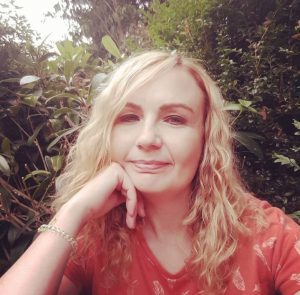
Firstly manage your expectations. Before I got published I used to dream about signing a movie deal and would imagine myself on a red carpet. If you do this you’re setting yourself up for failure. Film rights sell but the movie you fantasise about rarely comes to fruition. So don’t start off by coveting the success of the biggest bestselling authors. Just finishing a manuscript is a huge achievement, let alone getting it published. Take your career step by step – it’s a cliche but I visualise mine as a ladder. You eventually bag an agent. Or a publisher. Perhaps both. Your first book is out. Then your second. Then another. Perhaps one or more of your books appear in foreign languages or audio format. You gain a bestseller flag on Amazon. Maybe you win an award.
But none of this is going to happen at once. It’s a long road to writerly success punctuated with disappointments – they are part of the journey. Never forget to appreciate the small things. A positive rejection letter. A good review. A lovely book cover. That was one of my problems before – I was always chasing the bigger picture. I work hard at not doing that now and feel much happier and fulfilled.
Secondly – realise your work is not you. What I mean by this is… if you get a bad review, never forget that is someone’s opinion of your writing, NOT YOU AS A PERSON. If one of my books sank in the charts, for example, I used to tell myself I had failed. And that led me to seek unhelpful coping mechanisms to make myself feel better, such as drinking or eating junk food.
Nowadays I distance myself and whilst my writing is my vocation, my lifeblood, I try to be more clinical and objective about certain aspects.
And don’t obsess over reviews or rankings. Limit how often you go into Goodreads or onto Amazon.
Thirdly – don’t get carried away with the branding. I used to love promoting my romantic comedies and was a real kittens and cupcakes kind of author. But then, when my mental health became poor, this became tough. I didn’t feel I could talk about the challenges I was facing as they didn’t match that image. An image that was the real me but, as my health failed, didn’t represent the whole. So my advice – some may disagree – is that whilst branding is very important it mustn’t have the final say on how you use social media.
Fourthly – one of the gift’s from AA is the mantra “Accept the things you cannot change” In the past I used to stew about the what ifs, and if onlys. What’s the point? Now I’ll simply shrug my shoulders – it’s not always easy – and say to myself “It is what it is”. This is extremely liberating and gets rid of the pent up frustration.
This ties into mindfulness – focusing on the present. Had a bad review yesterday? No matter. It’s been and gone. Worried about next week’s book signing? No point. It will be what it will be. Getting anxious and projecting into the future won’t change that. You haven’t got a crystal ball. Don’t fool yourself that you have.
Lastly and on personal note as someone recovering from alcoholism and eating disorders, keep an eye on your drinking and food habits. Alcohol is a big part of the publishing industry. Wine o’clock. Prosecco parties. Boozy book launches. Drinking in moderation, in a social setting is one thing – but drinking to change the way you feel is quite another. If that’s what you are doing you need to see this as a warning sign. I used to drink to further boost the great feeling of a good ranking. Or to make myself feel chirpier after a poor review. Slowly, insidiously this escalated and before I knew it I could find any excuse.
If you do anything – drinking, eating, shopping, gambling – to give yourself a boost, to take the edge off a disappointment, to relax yourself after a busy day, then you are doing it to change the way you feel and need to step back before it becomes addictive and out of control.
Find different, healthier coping mechanisms. Go for a walk. Meet a friend for a chat. Have a candle-lit bath. Learn to meditate.
I love my career and feel blessed to have had so many novels published, to have had bestellers. My writing hasn’t been to blame for my problems. Nothing – no one – is to blame but myself and the way I’ve dealt with challenges. But do yourself a favour and bear these tips in mind. Being an author is a wonderful thing if you have the right tools to deal with the rollercoaster ride.

July 25, 2018
They Are Us
When I found myself attending group therapy in an addiction centre, in 2016, I had no idea of the journey ahead of me to get sober. Three months there. A further three months in recovery services. Then I took a three month course to learn how to peer mentor young people in addiction. And all the while I was attending AA meetings. I did the 12 step recovery programme and I’m now exceptionally grateful to be 18 months sober. It’s a continuing work in progress. I won’t ever take my sobriety for granted.
Also, I won’t ever take for granted the life I have now. During those nine months in services I got to know people who were or had been homeless. One was a rough sleeper. She is in drug addiction and shared her story with me. A story that was one of the things that inspired my new book, Forgive Me Not.
She knew I was writing this novel and opened up about her life on the streets. How, she used some of the money the public gave her for drugs – to keep her “topped up” to a level that made her existence bearable. The rest was collected to hopefully pay for a Bed & Breakfast each night. She needed £80 for that and didn’t always reach her target. In that case she’d sit in the doorway of a shop that had CCTV. She felt safer that way.
I saw her recently for the first time in months, back in her usual spot. She gave me a hug. Said she was proud of my book. Asked how I was. Said I looked well. We exchanged the usual banter. I gave her some money. She thanked me profusely. As usual her cheerful, upbeat gratitude and attitude touched me deeply.
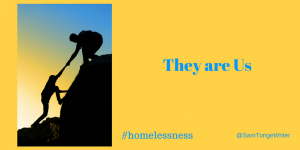
It’s easy to dehumanise the homeless – to see these people as them not us. But due to spending many hours in AA – due to all my research – I’ve learnt how anyone of us could find ourselves in their situation. The reasons behind homelessness are very varied.
Care leavers, aged 18, with no family in their lives, are an especially vulnerable group. As are Army veterans with PTSD. Plus those in situations of domestic violence or those with other mental health issues. Another friend in treatment was forced to flee an abusive domestic set-up, leaving everything behind. She had no choice but to go into a hostel and start her life again from scratch.
Life-changing events make people vulnerable, if they suffer a trauma such a bereavement that sends them into a depression that means they can’t face work, they can’t pay bills, they don’t care about themselves or responsibilities any more…
And then there’s addiction. One single incident can trigger a very rapid spiral into homelessness. Say an addict one day loses their job. They can’t pay the rent or mortgage. Finally their family’s had enough of the behaviours that now worsen. As have friends…
I’m so grateful I hit my rock bottom before reaching the end of the alcoholism spectrum – before I did real damage to other people; before I found myself heading down that spiral. Wine o’clock could have had a far from glamorous ending.
It’s impossible to live in a city – I’m in Manchester – and not be aware of the homelessness tragedy. I stop to give change. Sometimes I have a quick chat. Not all rough sleepers are in addiction but due to my experience I guess it’s not difficult for me to see past the violent, aggressive or anti-social behaviours in the ones that are; to realise that person who might be using to the point of oblivion once had a life like mine with loved ones, mates, a purpose to get up each day – and a place to live. To realise that if they didn’t have all those things, they’ve probably come from a challenging background of mental health issues or neglect.
If you feel you want to improve a rough sleeper’s life in some small way but don’t want to give them money, here is a list of things that would be so useful. Pound shops provide them all cheaply.
Sanitary protection
Vitamin tablets
Deoderant
Socks
Hand wipes
Tissues
Chapstick
Plasters
.

July 19, 2018
This Is Me
My name’s Sam and I am an… we all know how this sentence ends. But not everyone knows exactly what it means to say it. That’s why I’m sharing my story which will explain the inspiration behind my upcoming novel, Forgive Me Not.
In August 2016 I found myself sitting in an addiction clinic. This will probably be a shock to those who know me. It shocked me too. My drinking had grown from the weekend, to stretch across Thursday and Sunday. Then it was every night, any excuse. It softened a bad review and added sparkle to literary celebrations. But truth be told, the problem had been growing for years, way before I became an author. I suffered from anorexia and bulimia at university and recently my eating issues have returned. The rooms of AA are filled with people who’ve had – or have – eating disorders. The mental issues behind the behaviours are very similar.
Fear and denial kept me away from the doctor. I hadn’t lost my job yet, my family, not all my friends, my house, I wasn’t drinking twenty-four seven, I didn’t end up sleeping on the streets or in prison or sectioned… My problem wasn’t yet obvious.
But certain areas of my life and the mental distress were becoming unmanageable. I couldn’t face life with alcohol. I couldn’t face life without it.
When I finally went to my GP, back in February 2016, it initially proved difficult to get the expert treatment I needed. Eventually a counsellor directed me to the alcohol services for my area and for three months I had outpatient treatment – group therapy – at an addiction clinic where I was treated by hard-talking former addicts. Then I moved to recovery services for a further three months, where I learnt about mindfulness and wellbeing. I gave talks to children in High School about my drinking and eating problems. I trained for another three months to become a peer mentor to young people in addiction.
During those nine months I shared my story and listened to new friends talk about their addiction in the context of work, domestic abuse, prison life and homelessness.
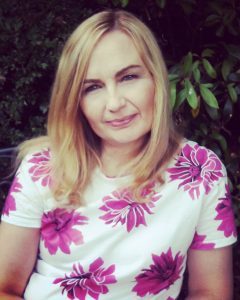
People chat to each other about trying to cut down on unhealthy foods or stopping smoking, but you’ll rarely hear a conversation where one person says they are seriously worried about their alcohol habits – because there is such a stigma attached to regularly drinking too much. And yet many people are and as long as this fear of being truthful about our intake exists, hospital beds will continue to fill with people suffering from alcohol-related illnesses.
Society needs to be talking openly about it.
A considerable part of recovery is making alcoholics aware of the hurt we might have caused others. We won’t get better until we realise that no one is to blame for our drinking but ourselves. We need to face up to the consequences of what we’ve done – and that difficult process is what originally inspired my new novel.
Forgive Me Not isn’t my story. It is made up of characters who go on their own journeys. However it is written completely from the heart. From personal experience I know that saying sorry isn’t always enough.
I’ll never forget going into the rooms of Alcoholics Anonymous for the first time. I envisaged there would be old men in dirty macs, sitting on their hands longing for a drink. How wrong I was. It was full of warm, welcoming, happy people of all ages and backgrounds who wanted to share their joy of sobriety. I did the Twelve Step recovery programme with my wonderful sponsor.
AA isn’t for everyone, but it isn’t scary. The thought of going is. And it shouldn’t be. Alcohol abuse is a growing problem, particularly amongst people of my age who buy a bottle of wine to unwind at the end of the day. Society needs to reach a position where people can talk about their drinking habits without the fear of being judged.
I’m still Sam the wife, mum and author, who likes cats and writing and cake. That person, in real life and online, hasn’t gone anywhere. It’s helped no end, the last couple of years, to use social media to talk about the positive aspects of my life, whilst dealing with my demons away from the keyboard. Posting my inspirational memes probably helps me as much as anyone else. It’s only now that I feel strong enough to share my experience. I’ve faced my problem head on and stopped drinking. I’ve made amends where possible and it’s taken a while, but I’ve finally forgiven myself.
I’ve accepted that this is me.
More than ever I love my amazing husband and children whose unquestioning support has been a big part of the reason that I’m now eighteen months sober. I’m full of gratitude for the help given to me by them, friends, AA and professionals.
If any of you reading this are struggling with drink, get help now before things worsen – which they will. Go to your doctor. Speak to a relative or friend. Go to AA – the only qualification needed to attend is that you want to stop drinking but can’t. They won’t take your name or ask for personal details or write anything down. No one will tell you you’re an alcoholic – you’ll decide for yourself by listening to everyone else’s stories and seeing if you can relate to the feelings.
You won’t stand out as different. Alcoholics are ordinary people.
If you are worried about your own intake reach out and tell someone before the wine o’clock everyone jokes about turns into a ticking time bomb.
You may be an alcoholic. You may not.
But if you are, I’m getting better one day at a time.
So can you.




